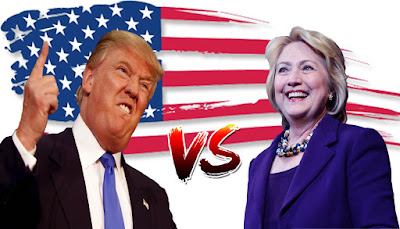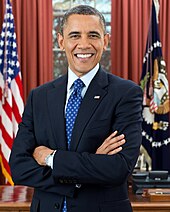The United States presidential election of 2016 is the 58th and most recent quadrennial American presidential election. It consisted of a popular vote, held on Tuesday, November 8, 2016, and an electoral vote, scheduled for Monday, December 19, 2016. The Republican ticket of businessman Donald Trump and Indiana Governor Mike Pence defeated the Democrat ticket of former Secretary of State Hillary Clinton and Virginia Senator Tim Kaine. Trump is expected to take office as the 45th President on January 20, 2017; Pence is expected to take office as the 48th Vice President.
Voters selected members of the Electoral College in each state, in most cases by "winner-takes-all" plurality at the state level; those electors will in turn vote for a new president and vice president on December 19, 2016. Trump obtained the required majority to become President-elect of the United States, winning 30 states with 306 electors out of 538. His victory had been considered unlikely by most media forecasts. Clinton received about 2.9 million more votes nationwide, 2.1% of the total cast. This is the fifth time after the 1824, 1876, 1888, and 2000 elections that the president-elect lost the popular vote.[a] Trump was the first person in U.S. history to be elected President without any prior experience in public service, whereas Clinton was the first woman to be the presidential nominee of a major American party.
On December 9, the Central Intelligence Agency issued an assessment to lawmakers in the US Senate, stating that Russia intervened in the election to help Trump win by releasing hacked Democratic Party material through WikiLeaks. President Obama ordered a "full review" into the matter, while President-elect Trump mocked the assessment and criticized US intelligence services.[6][7][8]The Federal Bureau of Investigation and National Security Agency agreed with the CIA report on Russian interference.[9]
Contents
[hide]Background
Further information: United States presidential election § Procedure
Article Two of the United States Constitution provides that the President and Vice President of the United States must be natural-born citizens of the United States, at least 35 years old, and residents of the United States for a period of at least 14 years. Candidates for the presidency typically seek the nomination of one of the political parties of the United States, in which case each party devises a method (such as a primary election) to choose the candidate the party deems best suited to run for the position. Traditionally, the primary elections are indirect elections where voters cast ballots for a slate of party delegates pledged to a particular candidate. The party's delegates then officially nominate a candidate to run on the party's behalf. The general election in November is also an indirect election, where voters cast ballots for a slate of members of the Electoral College; these electors in turn directly elect the President and Vice President.
President Barack Obama, a Democrat and former U.S. Senator from Illinois, was ineligible to seek reelection to a third term due to restrictions of the Twenty-second Amendment; in accordance with Section I of the Twentieth Amendment, his term expires at 12 noon on January 20, 2017.
Primary process
The series of presidential primary elections and caucuses took place between February and June 2016, staggered among the 50 states, the District of Columbia and U.S. territories. This nominating process was also an indirect election, where voters cast ballots for a slate of delegates to a political party's nominating convention, who in turn elected their party's presidential nominee.
Speculation about the 2016 campaign began almost immediately following the 2012 campaign, with New York magazine declaring the race had begun in an article published on November 8, two days after the 2012 election.[10] On the same day, Politico released an article predicting the 2016 general election would be between Clinton and former Florida Governor Jeb Bush, while a New York Times article named New Jersey Governor Chris Christie and Senator Cory Booker from New Jersey as potential candidates.[11][12]



No comments:
Post a Comment